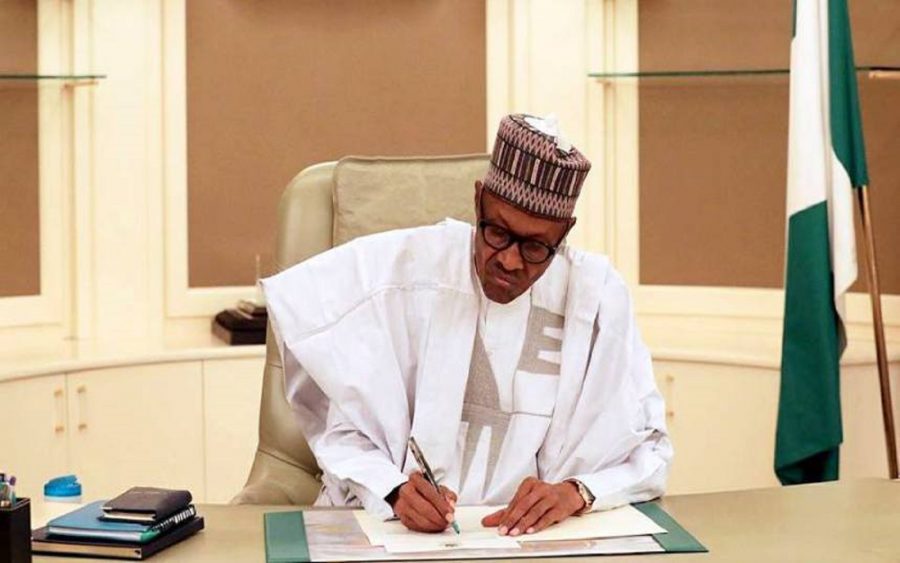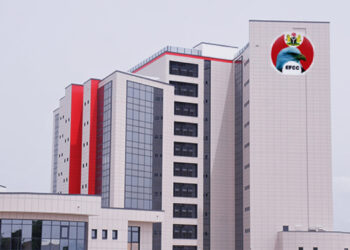Nigeria’s President, Muhammadu Buhari, on Wednesday appended his signature to the Nigeria Financial Intelligence Unit Bill (NFIU); thereby making it an act of law.
The newly signed law establishes the NFIU as the central body (independent of all other anti-graft agencies including the EFCC), which will be responsible for the collection, analysis, and dissemination of financial intelligence reports to law enforcement agencies.
As part of its responsibility to monitor all suspicious financial transactions in the country, the NFIU will also work in accordance with the global fight against money laundering and terrorism financing.
Speaking on the development, the President’s Senior Special Assistant on National Assembly Matters, Senator Ita Enang, told journalists that the NFIU will serve as the Nigerian version of the global Financial Intelligence Units (FIUs).
Prior to this time, the NFIU was domiciled in the Economic and Financial Crimes Commission (EFCC). It will now work as an autonomous unit, operating from the Central Bank of Nigeria (CBN).
“The Act establishes the NFIU as a central body in Nigeria responsible for the receiving, requesting, analysing and disseminating of financial intelligence to agencies and other relevant authorities to enable the institutions act on same. The agency is an independent and operationally autonomous institution domiciled in the Central Bank of Nigeria.” – Enang
Background to the signing of the bill
President Buhari’s signing of the NFIU bill followed the earlier passage of the same bill by the National Assembly; a move that was widely celebrated by financial experts in the country.
Recall that the 2017 passage of the NFIU bill by the Nigerian senate helped to avert the country’s expulsion from the Egmont Group
As at the time the bill was passed by the lawmakers, Nigeria was already suspended from the Egmont Group due to the country’s failure to legally separate the NFIU from EFCC; and by so doing giving it the necessary independent status that it deserves.
Note that the Egmont Group is a united body of 155 Financial Intelligence Units (FIUs) which serves as the platform for the secure exchange of expertise and financial intelligence towards the fight against money laundering and the financing of terrorism. Nigeria joined the organisation in 2005, but was not granted full membership until 2007.
Why President Buhari signed the bill into law
The President signed the bill because it is beneficial to the country. As we reported earlier, Nigeria risked being expelled from the Egmont Group, a development that would have portended lots of negative implications for the country.
Some of these negative implications are briefly discussed below:
- Negative implication on Nigeria’s fight against corruption, seeing as an expulsion from the global FIUs would have meant that the country would no longer have access to financial intelligence from sister agencies outside the country.
- Nigerian banks would be unable to issue ATM cards by Mastercard and Visa.The banks’ card income will also take a hit, coming at a time when yields on money market instruments are dropping.
- Banks may also have to access foreign trade lines and loans at a premium, making such funds slightly more expensive for them. This added cost will be in turn passed to businesses and customers.
- E-commerce businesses in Nigeria would also be affected by Nigeria’s possible expulsion from the Egmont Group, seeing as their business models are primary online-based. In other words, they would be forced to rely on cash for transactions, which comes with higher processing costs. The expulsion could also throw a spanner in the Central Bank of Nigeria’s bid to improve financial inclusion.
- Worst still, Nigeria’s possible expulsion from the Egmont Group would force Nigerians to rely on cash for transactions abroad in the absence of cards. This could then push the average Nigerian to the parallel market, seeing as official markets limit the amount of cash one can buy per quarter. Parallel market rates are more expensive than official rates. Nigerians spend a large proportion of foreign exchange on upkeep for their wards schooling abroad, hospital bills, and personal travel allowance. Pressure on the parallel market then leads to a depreciation in its rates. Parallel rates will become more expensive. This then makes regular transactions even more expensive for the average Nigerian.



















